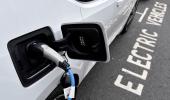Bengaluru outpaced Mumbai, Delhi, and Pune in 2023 to become India’s leading city for electric car registrations.

The city’s tech-savvy workforce, increased acceptability, zero road tax, subsidised electricity for EV charging, and a wide charging station network contributed to this surge.
Electric car registrations in Karnataka’s capital surged more than threefold in 2023 to 8,690 units, overtaking the growth witnessed in the other three cities, according to data from Jato Dynamics that Business Standard reviewed.
Bengaluru is not only embracing electric cars but also electric two-wheelers.
The city, according to the data, has consistently held the top position in India for electric two-wheeler registrations over the past four years.
Vivek Srivatsa, chief commercial officer (CCO) of Tata Passenger Electric Mobility (TPEM), attributed India’s technology city's up-move in electric car registrations to a combination of factors.
“Karnataka’s EV policy has been a significant driver towards EV adoption.
"This is through initiatives like zero road tax, subsidised electricity for EV charging, increase in government-owned public charging stations, and regular industry engagement,” he said.
He further said: “The city features a robust public charging ecosystem driven by various charging point operators (CPOs).
"This allows the community to continue spreading positive word of mouth about EVs.”
In 2023, India recorded a total of 87,927 electric car sales and registrations, according to Jato Dynamics’ data.
TPEM, a subsidiary of Tata Motors, dominated the Indian electric car market, securing a 71.7 per cent share in terms of volume.
Hyderabad climbed to the third spot for electric car registrations in 2023, up from fifth in 2022, thanks to its extensive charging infrastructure and tech-savvy workforce.
Registrations nearly trebled to 6,408 units, showed the data.
However, Mumbai dropped from first place in 2022 to fourth in 2023.
Industry sources suggest that range anxiety, lack of affordable electric car options, and insufficient public charging stations are slowing growth in some cities.
Chennai, Ahmedabad, and Jaipur maintained their positions at sixth, seventh, and eighth, respectively.
Tarun Garg, chief operating officer (COO), Hyundai Motor India (HMIL), told Business Standard that Bengaluru contributes more than 11 per cent of the company’s EV sales, making it the second-largest market for its EV portfolio.
The South Korean carmaker currently sells two electric cars — Ioniq 5 and Kona Electric — in India.
“Presence of numerous tech companies, startups, and a young, dynamic workforce has fuelled increased awareness and acceptance of EVs.
"Notably, 72 per cent of IONIQ 5 customers in Bengaluru are businesspersons, underscoring the city’s status as a hub for multinational companies and startups.
"Additionally, 22 per cent of Ioniq 5 customers in Bengaluru are female, double the overall HMIL average of 11 per cent.
"This reflects the city’s inclusive market dynamics,” Garg said.
He said Bengaluru has also seen a rapid development of EV charging infrastructure.
Moreover, HMIL has expanded its own public network of ultra-fast chargers in the city.
“We are also witnessing a dramatic shift of customers replacing their second car in the household with an EV.
"This is due to the ease of driving in traffic and its low running cost,” he added.
Additionally, Bengaluru has a thriving EV taxi segment, primarily driven by corporate fleets and EV ride-hailing apps.
“Together, these factors have driven rapid adoption in Bengaluru, with Tata EVs witnessing growth at 74 per cent year-on-year (Y-o-Y) in FY 24,” he added.
According to Jato Dynamics, Bengaluru and Pune have consistently been the top two cities for electric two-wheeler registrations in India over the last four years.
“These cities are not just embracing the future of mobility; they are shaping it.
"The robust startup ecosystem in Bengaluru, for instance, has not only diversified consumer options but also propelled the development of cutting-edge two-wheeler technology.
"Coupled with an extensive and ever-improving charging network, it's clear that Bengaluru is setting a high standard for EV accessibility and convenience,” said a spokesperson of Greaves Electric Mobility, which sells electric two-wheelers under the ‘Ampere’ brand name.
“Pune, on the other hand, is leading by example with its focus on solar-powered charging infrastructure, making EVs not just a sustainable choice but an accessible one for a broader demographic.
"The integration of charging facilities in new high-rise buildings is a forward-thinking approach that seamlessly integrates EVs into the urban fabric,” the spokesperson added.
When asked what best practices can other cities or states in India adopt from Bengaluru's approach to promoting the adoption of EVs, Srivatsa replied: “There is no better accelerator to adoption of any new technology than supportive government policies.
"Zero road tax and subsidised electricity only increases the value proposition of an EV.
"A strong public charging network in the city and on highways is also an important factor to consider in alleviating concerns around range anxiety.”
A strong push from corporate India is also a key growth driver — be it in the form of increasing numbers in the fleet segment or policies that encourage employees to purchase an EV, he said.
“In the commercial segment, taxi operators switching their fleet to EVs for intracity operations like airport pick up and drop is another avenue that improves EV adoption,” Srivatsa added.













 © 2025
© 2025